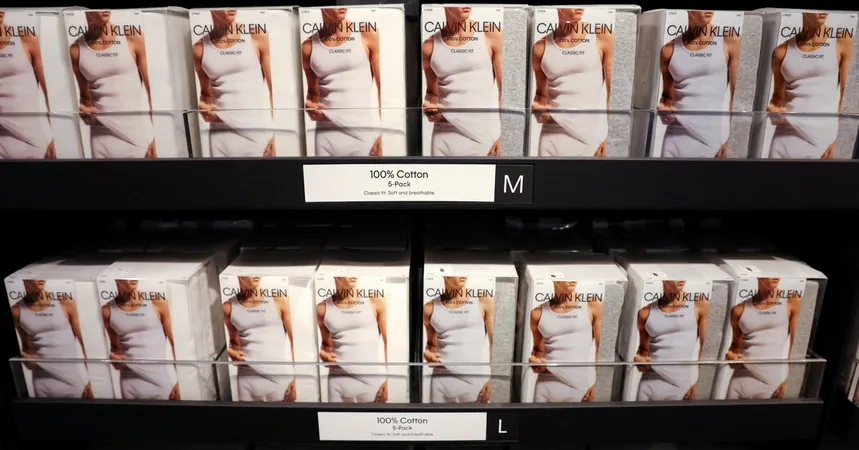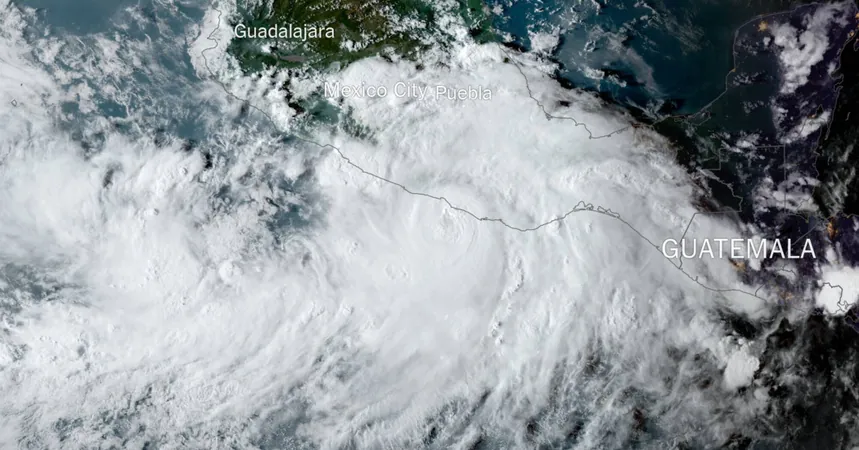
China Targets U.S. Retail Giant PVH in Xinjiang Labor Dispute: Are They Sending a Warning Sign?
2024-09-24
Introduction
In a bold move, China’s Ministry of Commerce announced on Tuesday that it would initiate an investigation into PVH Corp., the American parent company of popular brands like Calvin Klein and Tommy Hilfiger, over allegations of "discriminatory measures" concerning products sourced from Xinjiang. This investigation signifies China's intensified efforts to retaliate against Western nations that have imposed restrictions on goods from this controversial region.
Background on Xinjiang and Human Rights Concerns
Recent years have seen increasing scrutiny from Western governments of products linked to Xinjiang, following widespread allegations of human rights abuses, including mass detentions and forced labor affecting the Uyghur Muslim population. Research indicates that the region’s cotton production is heavily tainted by such coercive labor practices, leading to the surge of human rights advocacy resulting in boycotts.
China's Message to Multinational Companies
In a clear rebuke of Western pressures, China is sending a direct message to multinational companies: compliance with these international consumer boycotts could result in retaliation and punitive measures within China’s vast market. This situation puts corporations like PVH in an increasingly difficult position as they navigate the conflicting demands from both the Chinese government and international human rights groups.
PVH's Response and Broader Implications
PVH issued a statement asserting its commitment to all relevant laws and regulations globally, indicating they are currently engaging in communications with the Chinese authorities. Meanwhile, the scrutiny is not limited to PVH. The Inter-Parliamentary Alliance on China, which includes lawmakers from numerous countries, has called for the German automotive giant Volkswagen to exit Xinjiang amid allegations of complicity in the region's labor policies. This follows disturbing revelations from a leaked internal audit indicating Volkswagen failed to thoroughly investigate accusations surrounding forced labor in its supply chain.
Economic Context and Risks
China remains an essential market for many companies due to its status as the globe’s largest consumer market and leading manufacturer. Firms in the apparel industry, in particular, are heavily reliant on production facilities in China. The looming threat of Chinese reprisal could create significant risks for these companies, especially if Beijing decides to impose sanctions on their operations.
Legislative Responses in the West
In response to the growing evidence of human rights violations, the United States enacted the Uyghur Forced Labor Prevention Act in June 2022, which bans any imports from Xinjiang unless proven free from forced labor. This law has rendered it nearly impossible for companies to import cotton from the region, given the Chinese government's bans on independent investigations.
China's Counteractions and Nationalist Boycotts
In a bid to counteract boycotts from the West, the Chinese government has allowed nationalist groups to leverage China’s heavily censored internet to promote their own boycotts of Western brands. H&M suffered a tangible backlash as Chinese consumers began to shun its stores. Influential endorsers associated with brands like Tommy Hilfiger and Calvin Klein distanced themselves from these companies, further damaging their presence in the Chinese market.
Challenges for Western Brands
Despite these pressures, many Western brands remain hesitant to publicly discuss their Xinjiang policies. However, the Uyghur Forced Labor Prevention Act continues to incentivize companies to eliminate links with the region completely. Interestingly, China has enacted measures to penalize any company that complies with foreign laws that are seen to undermine its interests. The Ministry of Commerce can classify commercial decisions as threats to national security, which puts companies in a precarious position.
Potential Repercussions for PVH
PVH has been given 30 days to submit documentation proving its adherence to rules regarding procurement from Xinjiang. Should it be found non-compliant, the repercussions could be severe, including the ban on imports and exports, investment restrictions, or even fines. Notably, the ministry has already designated three U.S. defense firms on its "unreliable entity" list earlier this year, revealing the potential consequences of straying from Beijing's dictates.
China's Intentions and Future Outlook
Interestingly, as China strives to attract foreign investment amidst these tensions, it has attempted to clarify that actions against PVH are intended to uphold free trade rather than suppress it. "Honest and law-abiding foreign entities have nothing to worry about," the ministry stated, but skepticism remains given the current geopolitical climate.
Conclusion
As tensions between global brands and the Chinese government heighten, only time will tell how this complex web of commerce, human rights, and international diplomacy will unfold. Stay tuned!

 Brasil (PT)
Brasil (PT)
 Canada (EN)
Canada (EN)
 Chile (ES)
Chile (ES)
 España (ES)
España (ES)
 France (FR)
France (FR)
 Hong Kong (EN)
Hong Kong (EN)
 Italia (IT)
Italia (IT)
 日本 (JA)
日本 (JA)
 Magyarország (HU)
Magyarország (HU)
 Norge (NO)
Norge (NO)
 Polska (PL)
Polska (PL)
 Schweiz (DE)
Schweiz (DE)
 Singapore (EN)
Singapore (EN)
 Sverige (SV)
Sverige (SV)
 Suomi (FI)
Suomi (FI)
 Türkiye (TR)
Türkiye (TR)